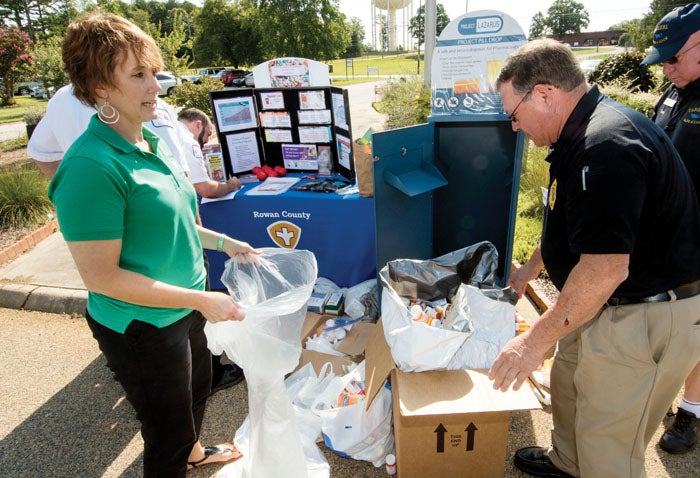Editorial: Big agency, small contact in Rowan
Published 12:00 am Sunday, September 3, 2017

- Rowan County Health Education Specialist Amy Smith (left) gets help from Rockwell Police Chief Hugh Bost to box up medication dropped at the Rowan County Agriculture building on Old Concord Road. The Rowan County Health Department advertised a medication drop box for the public to bring unwanted prescription and over-the-counter medicine. In the three hours the box was at the location, it was completely filled with discarded products. JON C. LAKEY / SALISBURY POST
If North Carolina is serious about conquering the opioid crisis, lawmakers could start by examining the mega-agencies they put in charge of the state’s mental health services. Citizens need a more direct path to the help they need.
Years ago, a Rowan County resident with a substance abuse, mental health or developmental problem had little trouble physically locating a place to seek help. The government-funded Tri-County Mental Health Agency had an office on Mahaley Avenue, as well as in the other counties it covered, Davie and Iredell.
Through the years, the state has steadily consolidated services, dividing 100 counties into seven regions, each served by a managed care entity. Cardinal Innovations Healthcare, the largest of the seven, serves Rowan and 19 other counties, though “serve” does not exactly describe what Cardinal does. Operating as a public nonprofit, Cardinal mostly manages and monitors services that others provide.
The state has received praise for pioneering this managed care approach to mental health services, though how the model benefits a Rowan citizen looking for help is not clear. The mega-agency model puts tremendous distance — and little accountability — between individuals and the agency said to be monitoring care.
A state audit released earlier this year was highly critical of Cardinal Innovations. Cardinal “has not demonstrated accountability in the use of its federal and state resources as evidenced by some of its spending,” the audit said. “This type of unreasonable spending erodes the public’s trust in Cardinal’s ability to deliver quality health care to a vulnerable population.”
Cardinal, which refers to itself as a company, defended its CEO’s $635,000 salary and said $250,000 spent by the board on retreats, meetings and travel expenses cited in the report represented only a fraction of expenditures compared to the more than $1.1 billion the agency spent on health care services during that same period.
Cardinal’s function may seem peripheral to discussion of the opioid crisis, but that’s just the point. Cardinal should be leading the charge against opioid addiction; it manages most of the state and federal money that could help people struggling with addiction. Instead, Cardinal seems to be more of a conduit than an advocate, and that leaves a void where mental health leadership could be powerful.
Rowan County is in a mental health/substance abuse crisis. We have one of the worst opioid overdose rates in North Carolina. Yet the state entity responsible for the services Rowan receives for mental health and substance abuse has little visibility here. Something is wrong with this picture.


